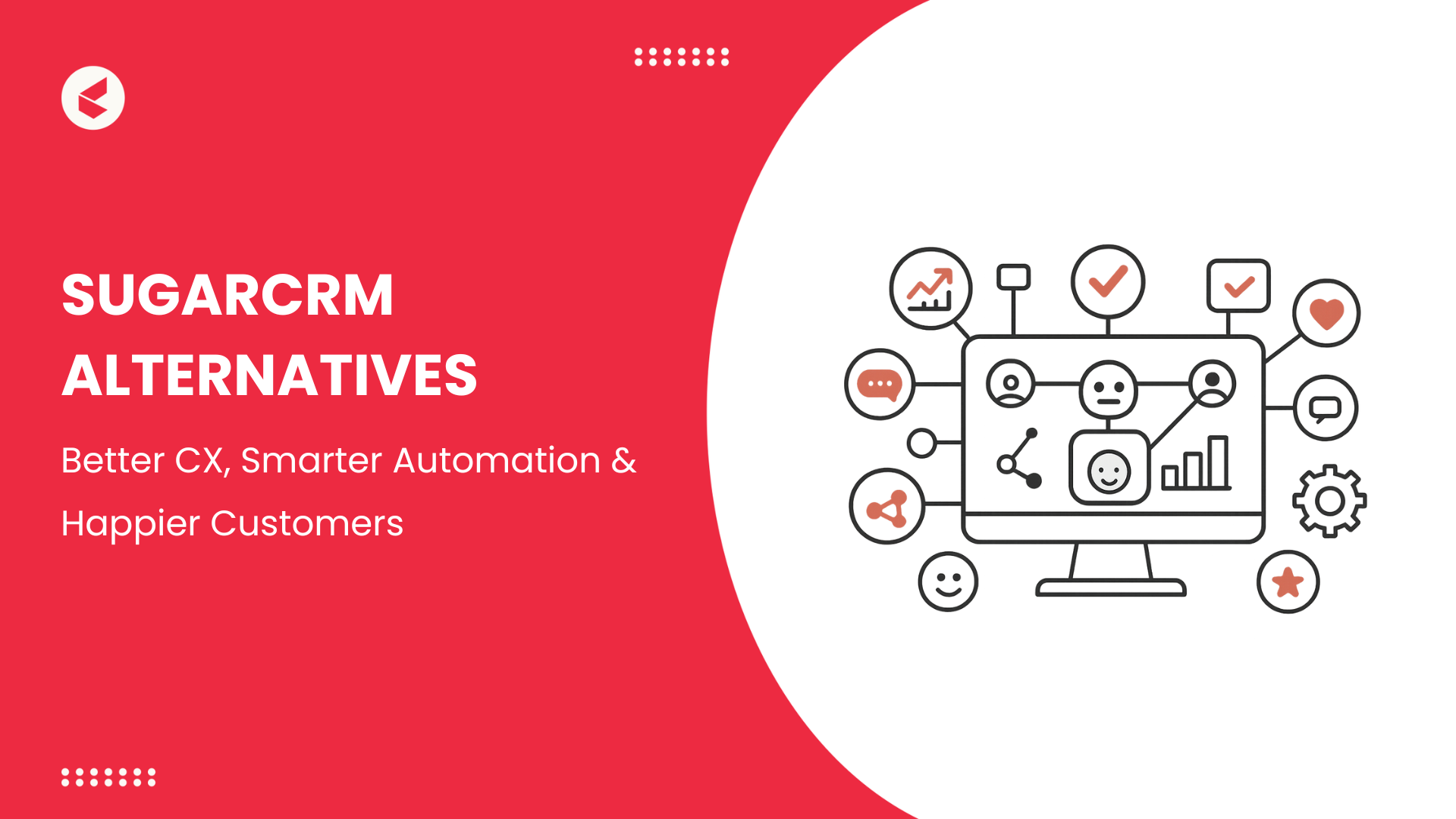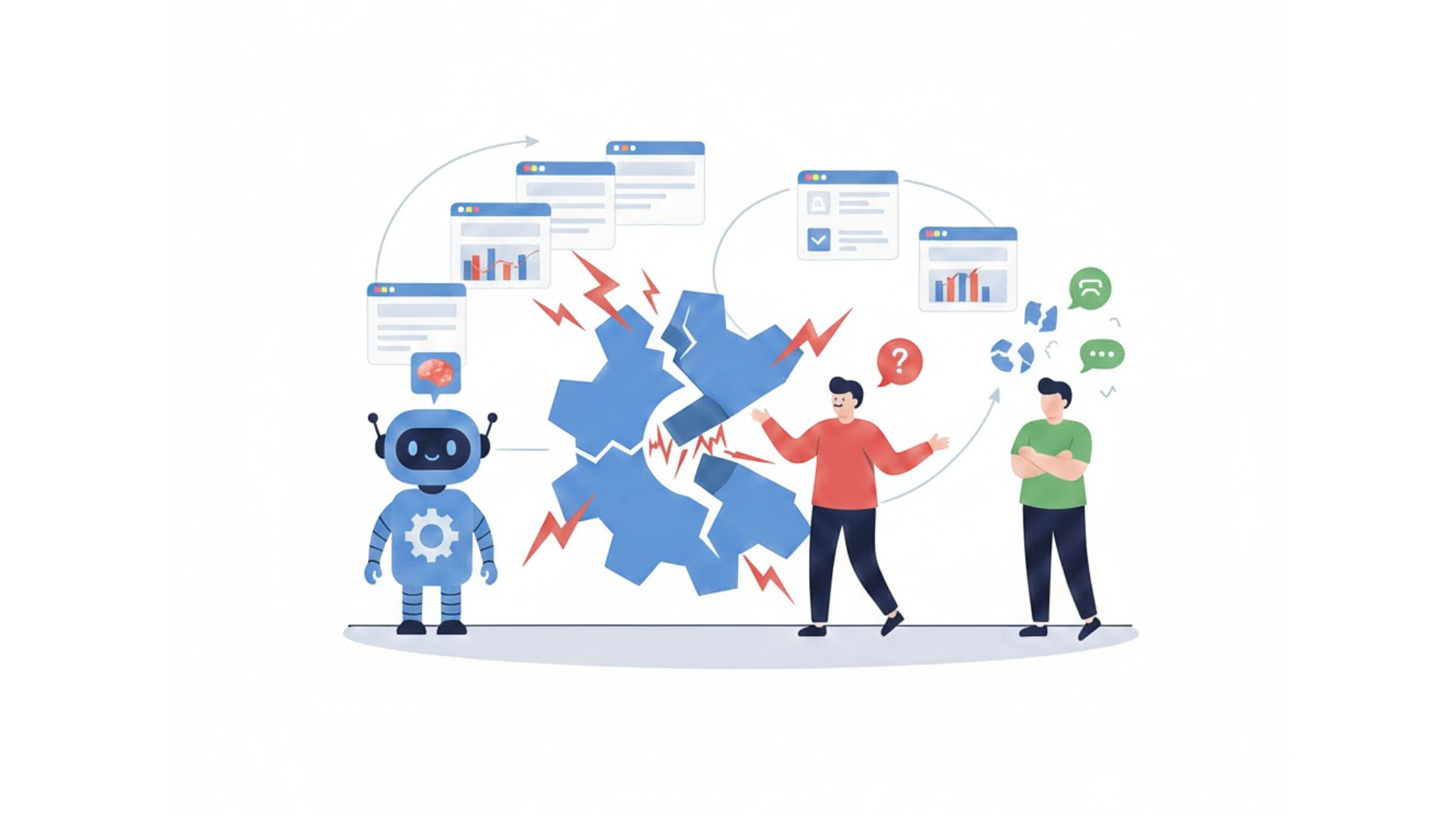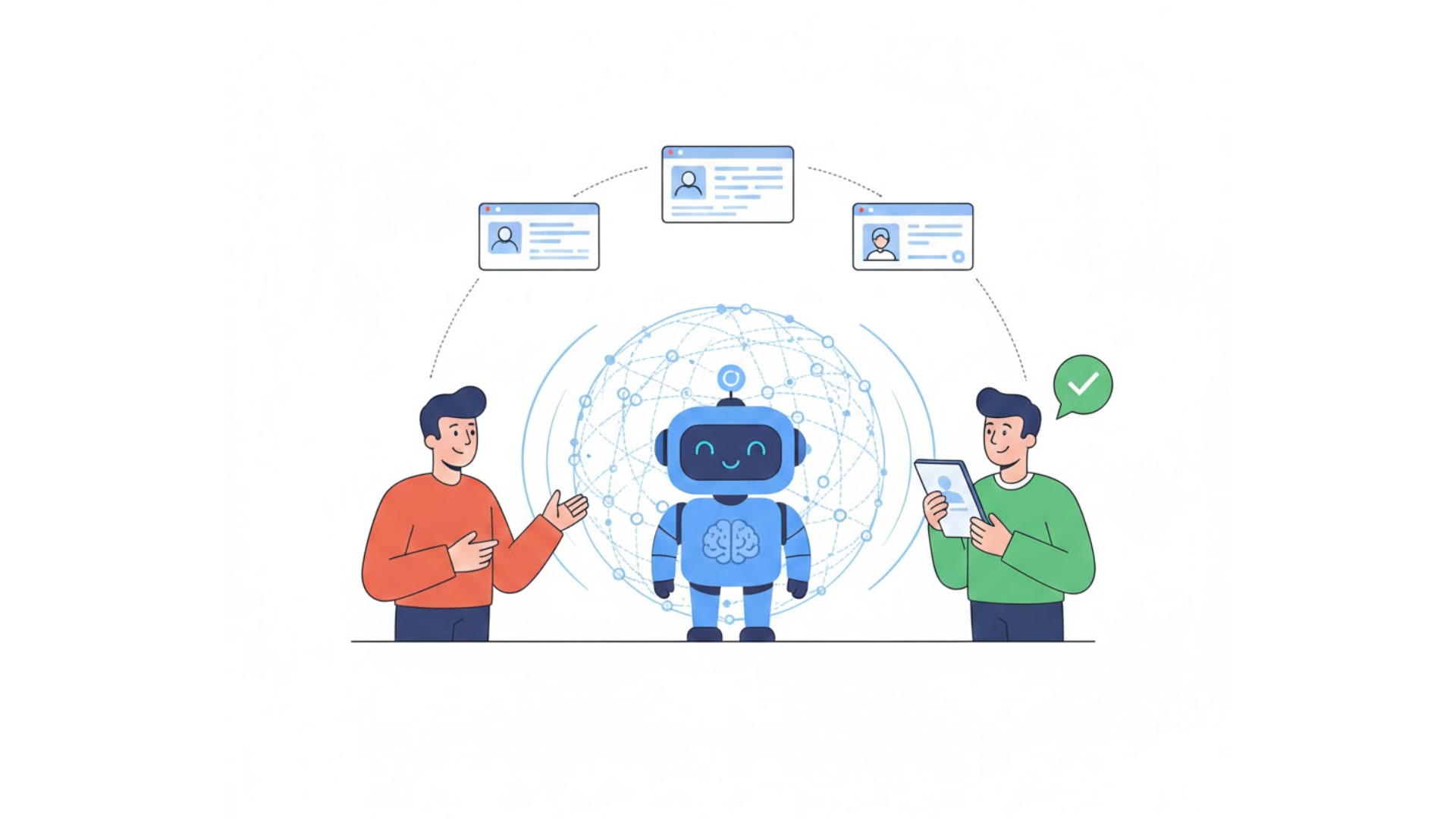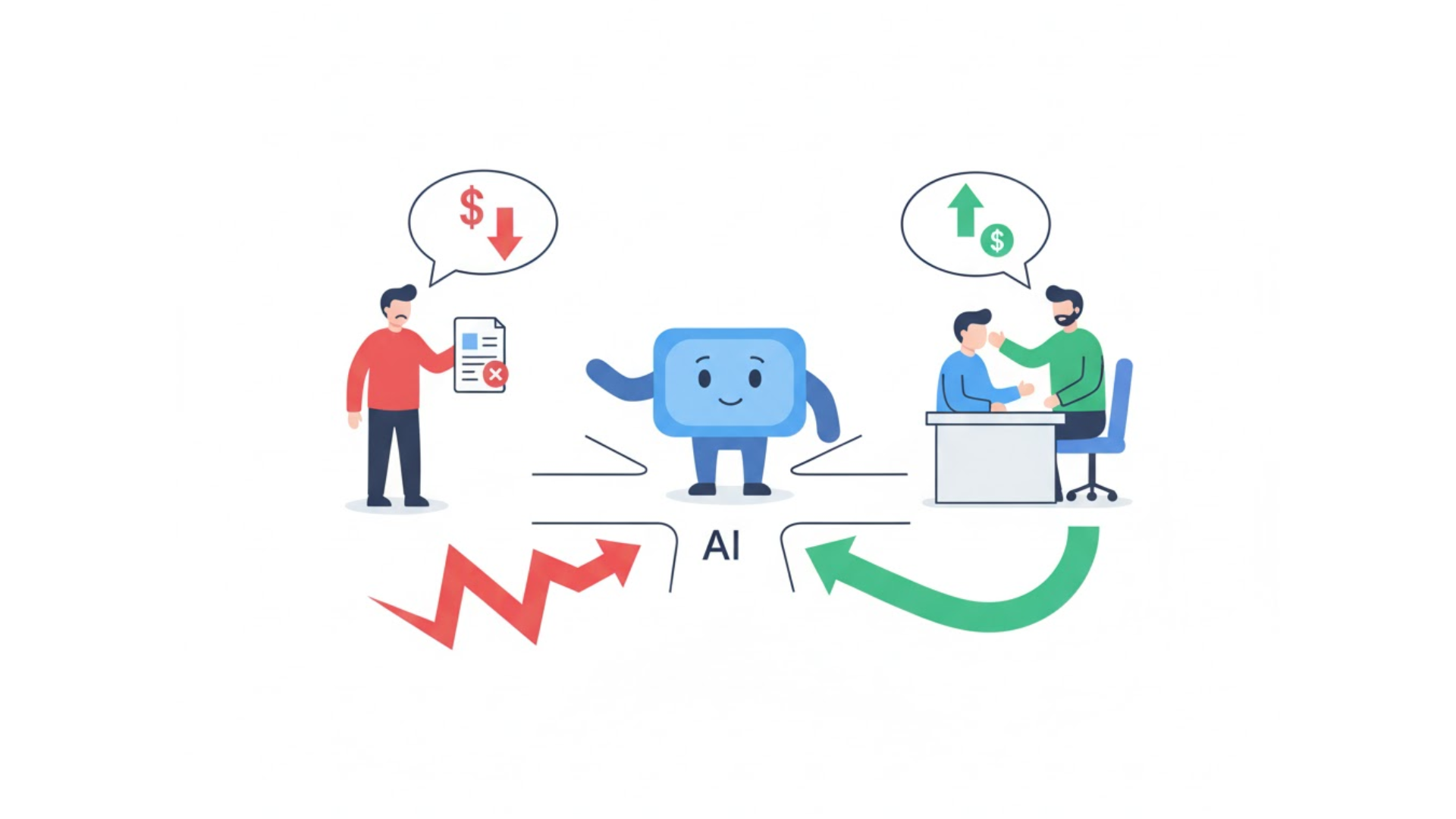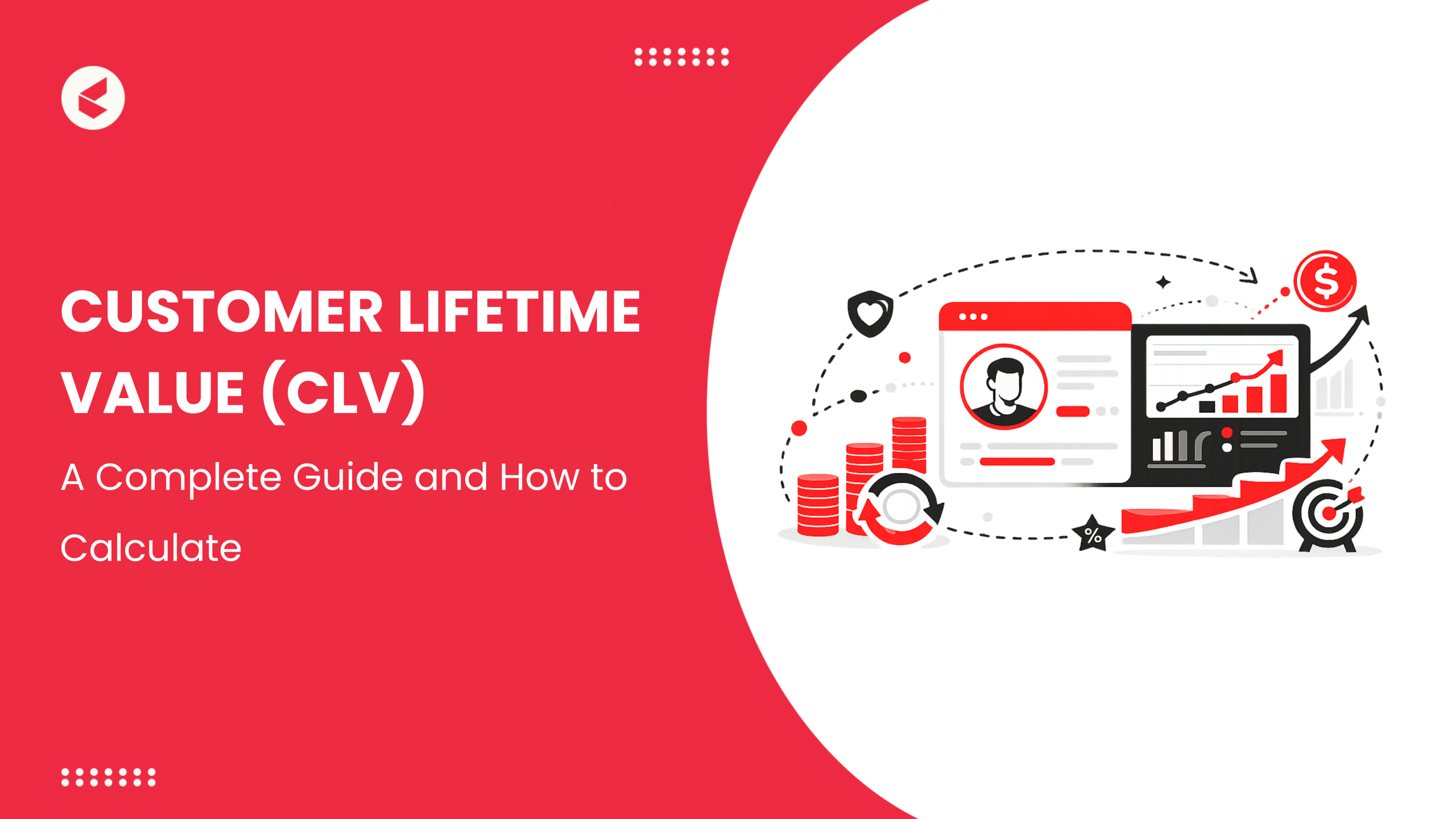Many businesses rely on CRM systems to manage customer interactions, but having a platform doesn’t always mean it works seamlessly.
According to Forrester, about 70% of organizations use CRM systems to run their customer service operations. However, the widespread adoption hasn’t made it easier for many teams to realize the full potential of these systems.
SugarCRM is a perfect example highlighting the benefits and difficulties associated with the existing CRMs. It links sales, marketing, and service in one system and offers a modular setup that allows companies to scale. Its modular setup also lets companies scale at their own pace.
However, customization can demand more technical effort than expected, and reports or dashboards often take time to fine-tune. This gap explains why older CRMs can hold teams back from delivering the fast, personalized service customers expect.
In the current business scenario, many companies have started to reconsider the importance of their CRM systems. The end objective is quite straightforward: to ease the work of the teams on a daily basis and to offer customers really remarkable experiences.
Continue reading to discover the best 13 CRM alternatives to SugarCRM that not only improve CX but also facilitate the workflows and make the automation smarter.
Why Businesses Are Looking for a SugarCRM Alternative
Many teams choose SugarCRM because it promises flexibility and control. Over time, though, certain challenges may start to appear, especially for service teams that need quick responses and connected workflows.
1. Technical Effort and Customization Overload
SugarCRM’s biggest strength also makes it demanding. It gives teams room to tailor the platform around how they work. That freedom is useful, though it can make the setup a bit more hands-on. Creating dashboards or linking automation and integrations sometimes takes extra technical effort to get right.
2. Upgrades and Maintenance Issues
Although the purpose of updates is to keep things functioning better, they can sometimes cause some moving parts to break. After some upgrades, teams notice that certain custom modules or integrations stop behaving as they should.
Fixing those issues usually means extra testing and small adjustments before everything clicks back into place.
3. Learning Curve and User Experience
SugarCRM offers numerous features that are beneficial in theory, but mastering them takes time. New users need some hands-on time to get used to the setup and understand how all the parts work together. It’s moderately easy to build workflows or connect channels; however, it is not a quick process.
4. Cost, Support, and Scalability Concerns
Some companies find that pricing and licensing can limit flexibility. Minimum user requirements and extra costs for certain modules or support add to the total investment.
Many US companies continue to use SugarCRM effectively, particularly those with strong technical teams. For service teams, though, the setup can feel heavy. Newer CRM tools tend to start faster, update more smoothly, and take less effort to manage.
Quick Comparison: Top SugarCRM Alternatives at a Glance
Choosing a new CRM can take a while, so here’s a quick look at how the top SugarCRM alternatives stack up. This table highlights each platform’s CX focus and G2 rating to help you shortlist faster.
| Platform | CX Focus | G2 Rating | Pricing (billed annually) |
| Kapture CX | Omnichannel support, AI routing, and built-in self-service tools | 4.6/5 | Custom modular pricing |
| Zoho CRM | Full-featured platform with Zia AI and an extensive app ecosystem | 4.1/5 | Standard: $14 per month/user Professional: $23 per month/user Enterprise: $40 per month/user Ultimate: $52 per month/user |
| Freshdesk | Centralized ticketing with automation and AI-powered assistance | 4.4/5 | Growth: $15 per month/user Pro: $49 per month/user Pro + AI Copilot: $78 per month/user Enterprise: $79 per month/user |
| Zendesk Support Suite | Unified workspace for enterprise support and deep integrations | 4.3/5 | Support Team: $19 per month/user Suite Team: $55 per month/user Suite Professional: $115 per month/user Suite Enterprise: $169 per month/user |
| Help Scout | Simple shared inbox with live chat and knowledge base options | 4.4/5 | Free Standard: Starting from $50 per month Plus: Starting from $75 per month |
| TeamSupport | B2B-focused support platform with account health tracking | 4.4/5 | Starter: $45 per month/user Professional: $65 per month/user Scale: $85 per month/user |
| Hiver | Turns Gmail or Outlook into a shared help desk for quick collaboration | 4.6/5 | Free Growth: $25 per month/user Pro: $45 per month/user Elite: $75 per month/user |
| LiveAgent | Combines live chat, email, and call center features in one dashboard | 4.5/5 | Small Business: $15 per month/user Medium Business: $29 per month/user Large Business: $49 per month/user Enterprise: $69 per month/user |
| Front | Shared inbox that connects email, chat, and SMS for team support | 4.7/5 | Starter: $25 per month/user Professional: $65 per month/user Enterprise: $105 per month/user |
| Gorgias | E-commerce service platform with store data and smart automation | 4.6/5 | Starter: From $10 per month (billed monthly) Basic: From $50 per month Pro: From $300 per month Advanced: From $750 per month Enterprise: Custom pricing |
| Monday Service | Flexible workspace for ticket management and workflow automation | N/A | Free Basic: $9 per month/user Standard: $12 per month/user Pro: $19 per month/user Enterprise: Custom pricing |
| HubSpot Service Hub | Integrated CRM for connected service, sales, and marketing teams | 4.4/5 | Free Starter: $9 per month/user Professional: $90 per month/user Enterprise: $150 per month/user |
| ServiceNow CSM | Enterprise platform for service automation and cross-team visibility | 4.4/5 | Custom pricing |
Top 13 SugarCRM Alternatives for 2026
The following are the best platforms that companies may use to improve customer experiences, expedite support processes, and take use of more intelligent automation than standard CRMs:
1. Kapture CX
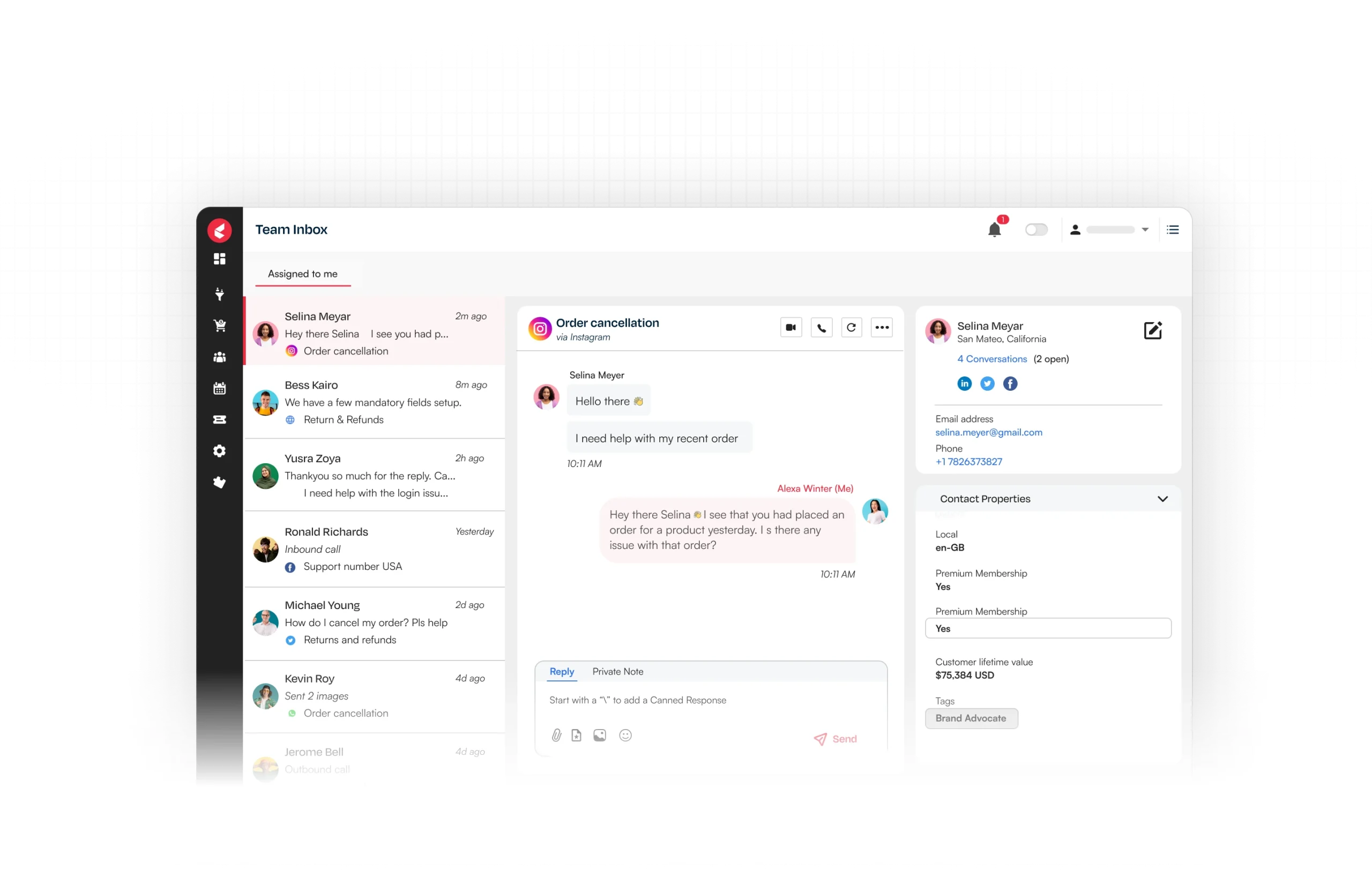
Kapture CX unites customer channels such as chat, email, voice, and social media in a single workspace. AI and analytics features simplify ticket handling and help agents deliver better support.
Why It’s a Great SugarCRM Alternative
- If your current CRM feels like it was built for sales and you’re retrofitting service on top, Kapture CX offers something more service-centric from the start.
- It helps teams set up omnichannel support, routing, and agent tools without spending weeks on customization. Getting started quickly means customers see smoother, more consistent service from day one.
Key CX-Focused Features
- Unified inbox across chat, email, voice, and social channels
- AI-powered ticket tagging, auto-assignment, and response suggestions
- Analytics dashboard that tracks trends in conversations, agent performance, and key support metrics
- Knowledge base and self-service tools that help lower incoming ticket volume
- No-code integration options to link with other business systems
G2 Rating: 4.6/5 (300+ reviews)
Ideal For
Teams that oversee numerous client contacts over multiple channels require a platform designed for customer care rather than a generic CRM.
Why It Stands Out for CX
The real difference is how Kapture CX organizes support around conversations, context, and agent productivity instead of forcing service into sales-oriented workflows.
2. Zoho CRM
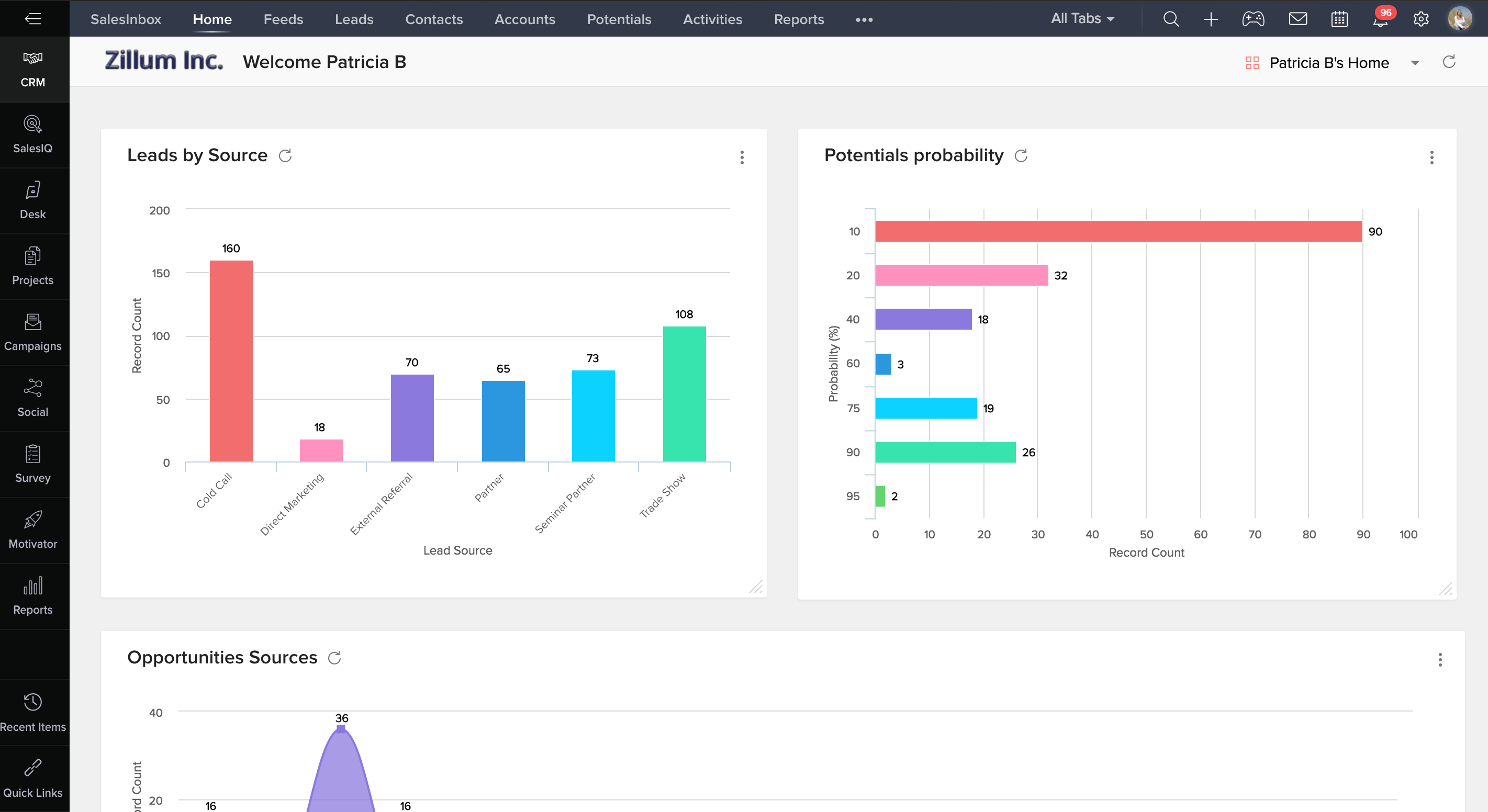
Zoho CRM is used by businesses across industries for managing contacts, deals, and automation. It comes with strong reporting features and connects easily to hundreds of tools. The platform can scale as your team grows, keeping things simple even as operations expand.
Why It’s a Great SugarCRM Alternative
Zoho’s built-in AI, Zia, helps teams work smarter by spotting patterns and handling routine tasks. When used with Zoho Desk and SalesIQ, it helps service teams keep every customer interaction connected and simple to track.
Key CX-Focused Features
- Automation for tasks, workflows, and customer interactions powered by Zia AI
- Engagement managed across chat, email, calls, and social media
- Custom dashboards that show live performance data
- Integration available with Zoho Desk, SalesIQ, and many third-party tools
G2 Rating: 4.1/5 (2,700+ reviews)
Ideal For
Businesses that need a cost-effective CRM foundation with AI capabilities and easy integrations for service, sales, and marketing.
Why It Stands Out for CX
Its native AI and ecosystem tools make it easier to deliver consistent, informed, and responsive customer experiences.
3. Freshdesk
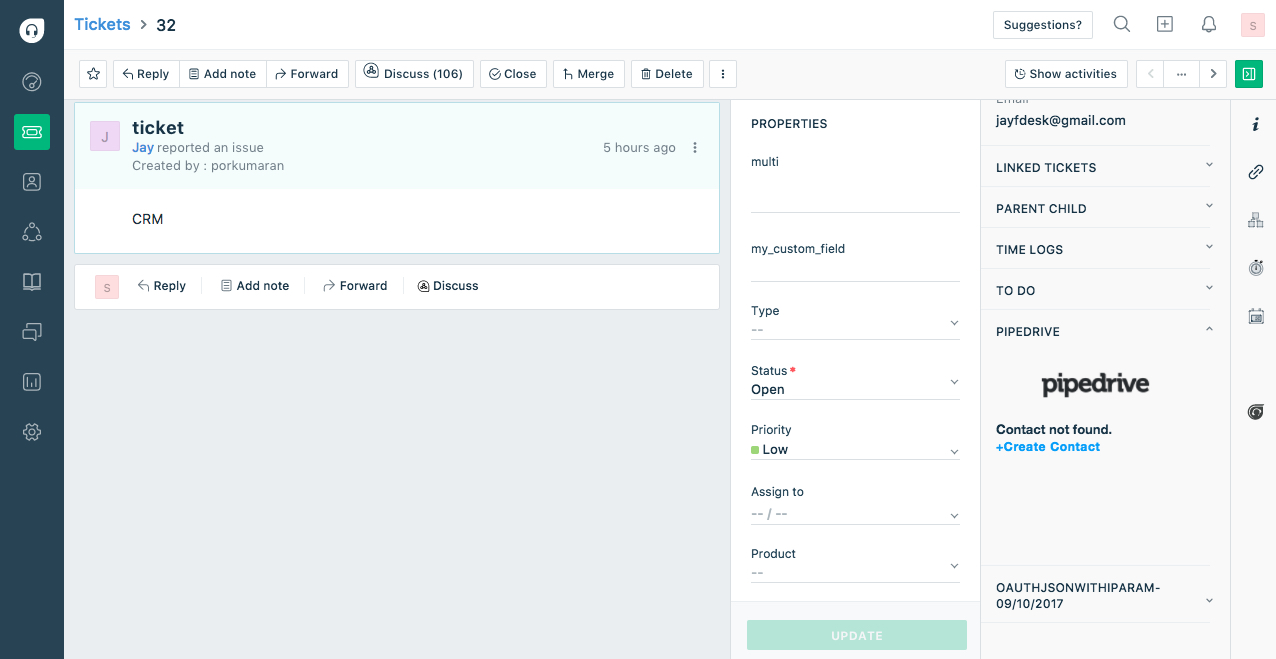
Freshdesk keeps customer service simple. AI, automation, and self-service work side by side, helping agents reply faster. That small shift cuts customer wait times noticeably.
Why It’s a Great SugarCRM Alternative
Freshdesk was created specifically for support teams, so setup feels smooth, workflows stay clear, and customization takes less effort.
Key CX-Focused Features
- Centralized ticketing across email, chat, phone, and social media
- AI assistant (Freddy AI) that helps with responses and ticket routing
- Shared inbox and internal notes
- Reporting dashboards to track SLAs, response time, and agent productivity
G2 Rating: 4.4/5 (3,500+ reviews)
Ideal For
Customer service teams that prefer a service-first platform they can use right away, without having to adapt a sales CRM.
Why It Stands Out for CX
Freshdesk keeps support teams focused on customers instead of the tools they use. Its AI capabilities and simple interface help deliver quick, reliable, and professional service.
4. Zendesk Support Suite
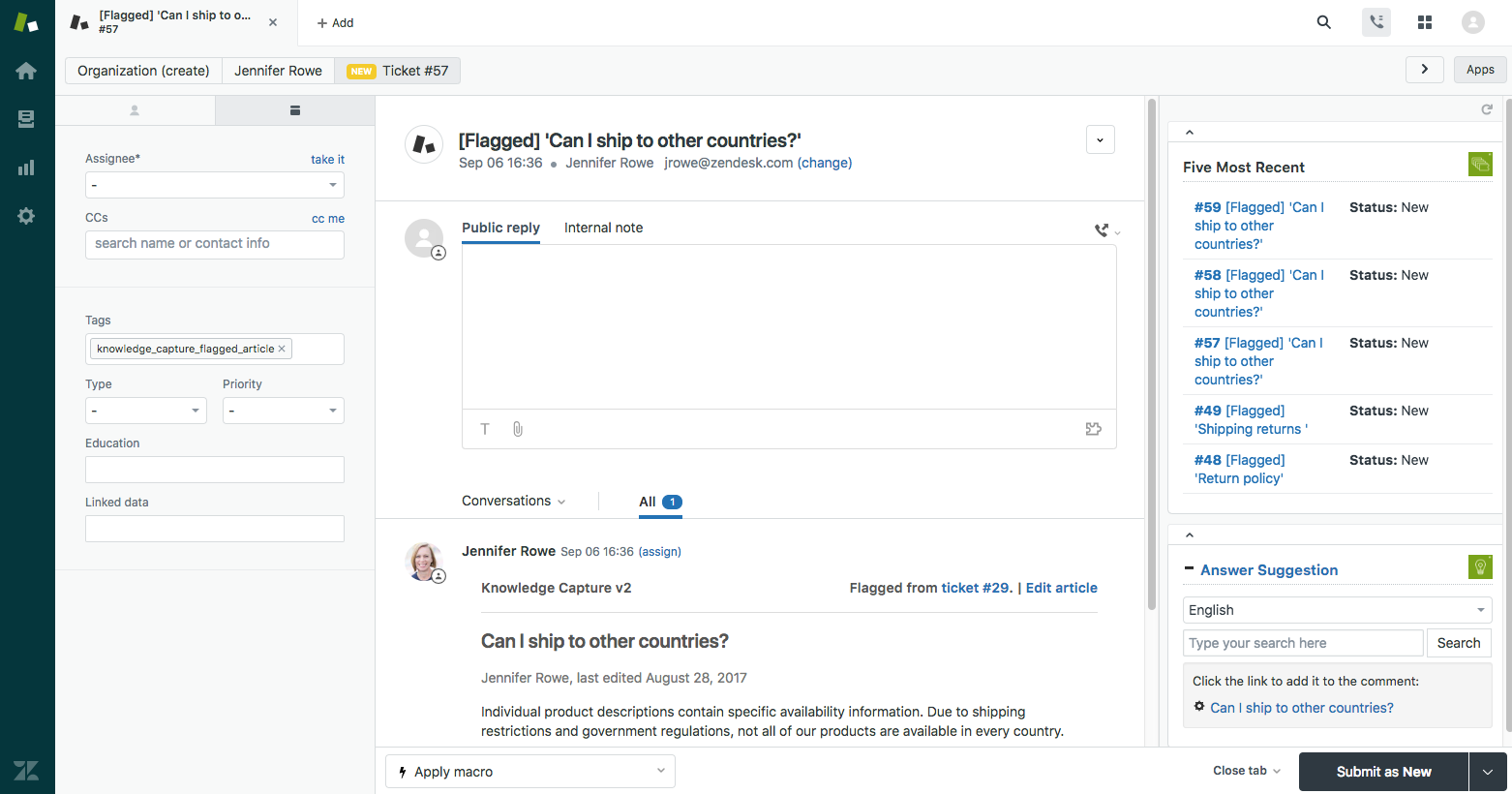
Zendesk Support Suite gives service teams everything needed to manage customer interactions in one place. It brings chat, email, voice, and social messaging together, along with analytics and a workspace that scales with the business.
Why It’s a Great SugarCRM Alternative
Zendesk has a strong service-operations focus for teams that find SugarCRM overly general or sales-focused. It helps agents collaborate across departments more easily by placing every interaction in context.
Key CX-Focused Features
- Unified support across chat, voice, email, and social media
- Customizable agent workspace with triggers and macros
- Advanced analytics that track response time, satisfaction scores, and agent efficiency
- Large integration library with 1,200+ compatible apps
G2 Rating: 4.3/5 (6,000+ reviews)
Ideal For
Mid-sized and enterprise service operations that handle large ticket volumes and need cross-channel visibility.
Why It Stands Out for CX
Zendesk prioritizes customer service. Even at scale, its tools enable agents to remain structured, comprehend context rapidly, and provide replies that feel intimate.
5. Help Scout
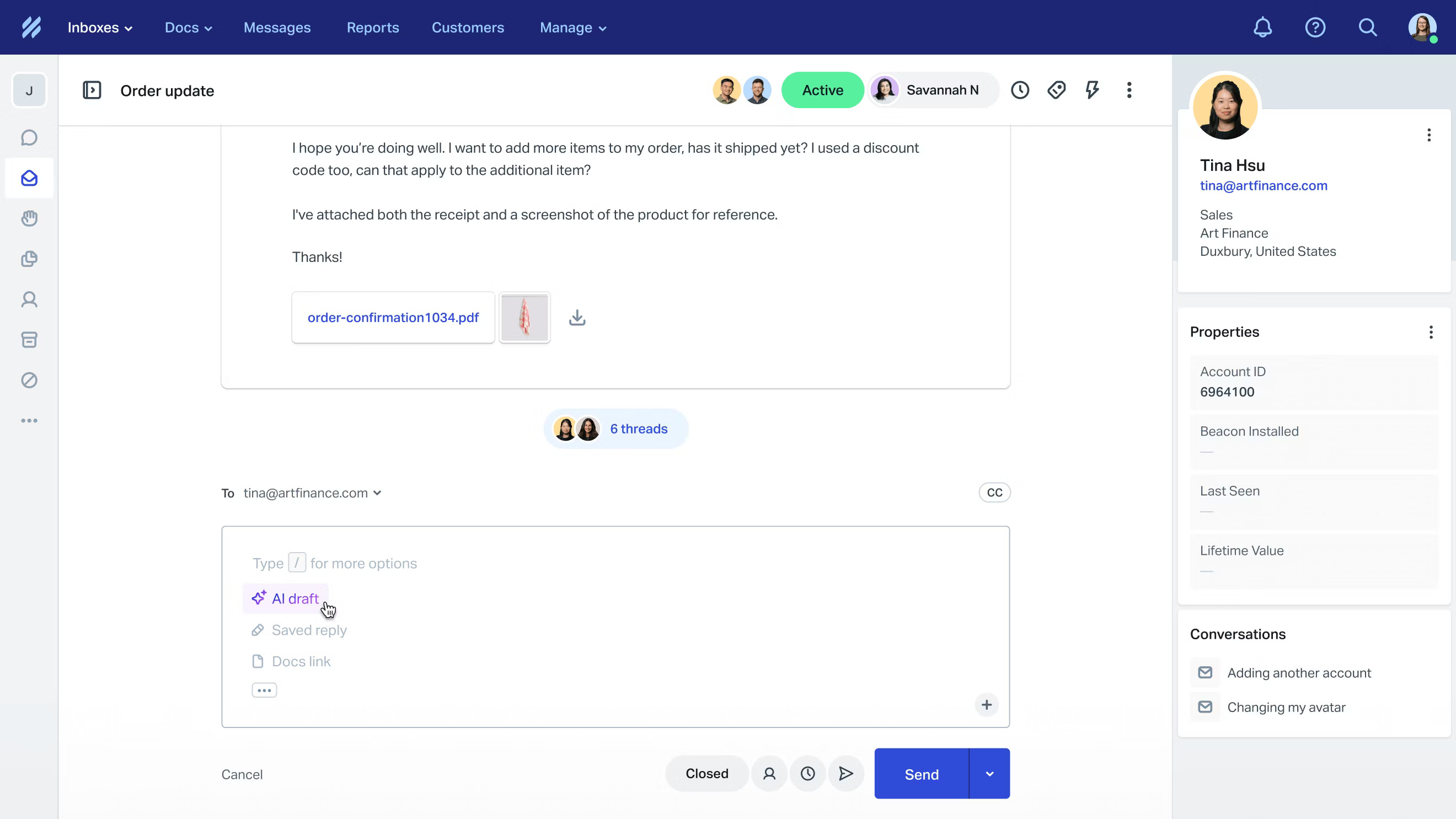
Help Scout is built around clear, human-centered customer support. It brings a shared inbox, live chat, a knowledge base, and success tracking into one easy platform that suits small and mid-sized teams.
Why It’s a Great SugarCRM Alternative
When a CRM starts to feel heavy or overbuilt for support teams, Help Scout offers a lighter, more direct option. It keeps setup simple, enables quick onboarding, and lets agents manage conversations without unnecessary complexity.
Key CX-Focused Features
- Shared inbox for email and chat
- Live chat with proactive messaging and real-time engagement
- Customer success tools for tagging, tracking activities, and setting milestones
- Integrations that link easily with Slack, Salesforce, and Zapier
G2 Rating: 4.4/5 (400+ reviews)
Ideal For
Support teams in small to mid-sized businesses seeking a clean, efficient service tool without CRM overkill.
Why It Stands Out for CX
Help Scout keeps the service experience simple so agents can focus on people. It enables meaningful, superior customer relationships while streamlining workflows.
6. TeamSupport
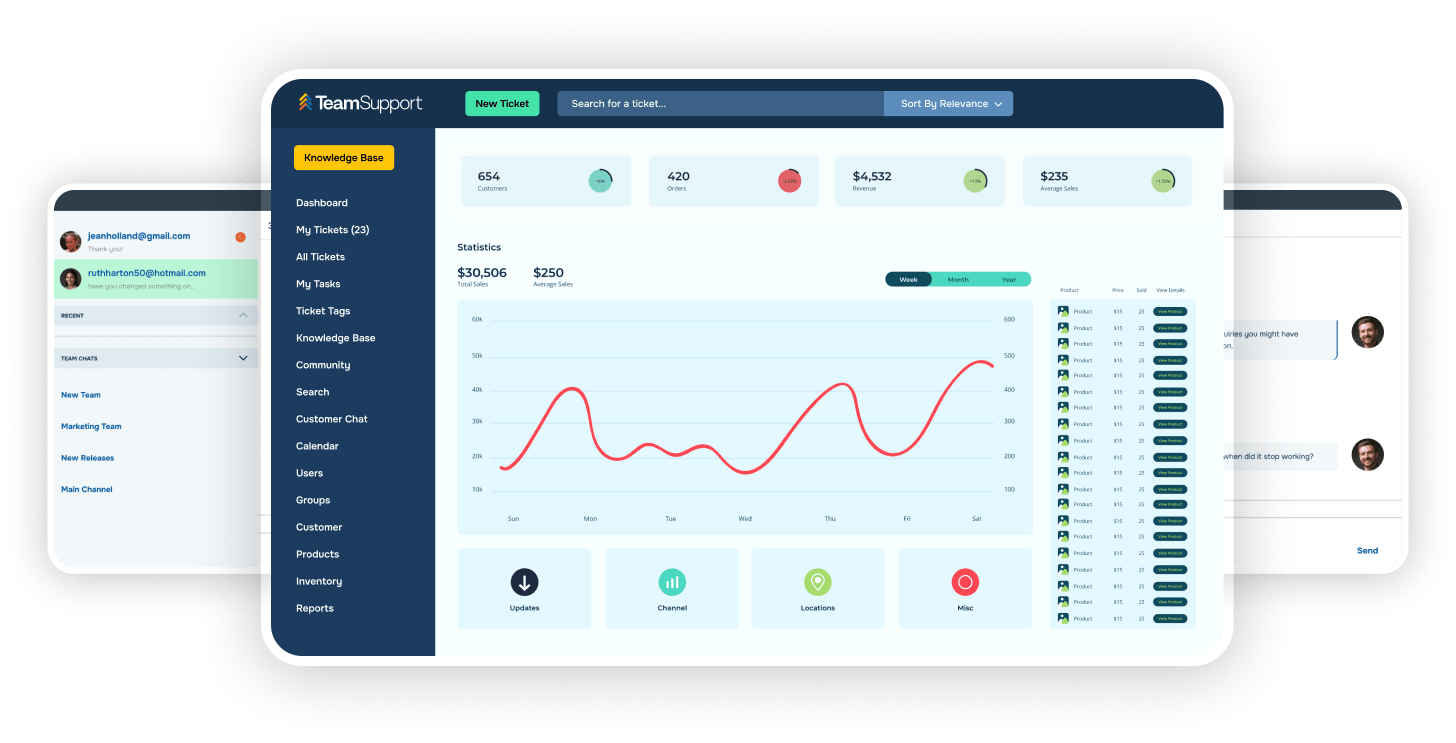
TeamSupport is designed for B2B support teams that manage complex accounts and multiple contacts per client. It blends ticketing, chat, analytics, and customer health tracking into one collaborative platform.
Why It’s a Great SugarCRM Alternative
TeamSupport provides a cleaner structure made specifically for customer service and account management. It helps service and success teams work together on issues, track satisfaction, and prevent churn.
Key CX-Focused Features
- Centralized ticketing and automation with clear escalation paths
- Customer Distress Index for monitoring account health and churn risk
- Built-in live chat and messaging
- Knowledge base and self-service tools
G2 Rating: 4.4/5 (800+ reviews)
Ideal For
Mid-size and enterprise teams that manage long-term customer relationships and need strong visibility into account health.
Why It Stands Out for CX
Service teams can view the entire customer journey in one location with TeamSupport and take prompt action to stop possible problems from getting worse.
7. Hiver
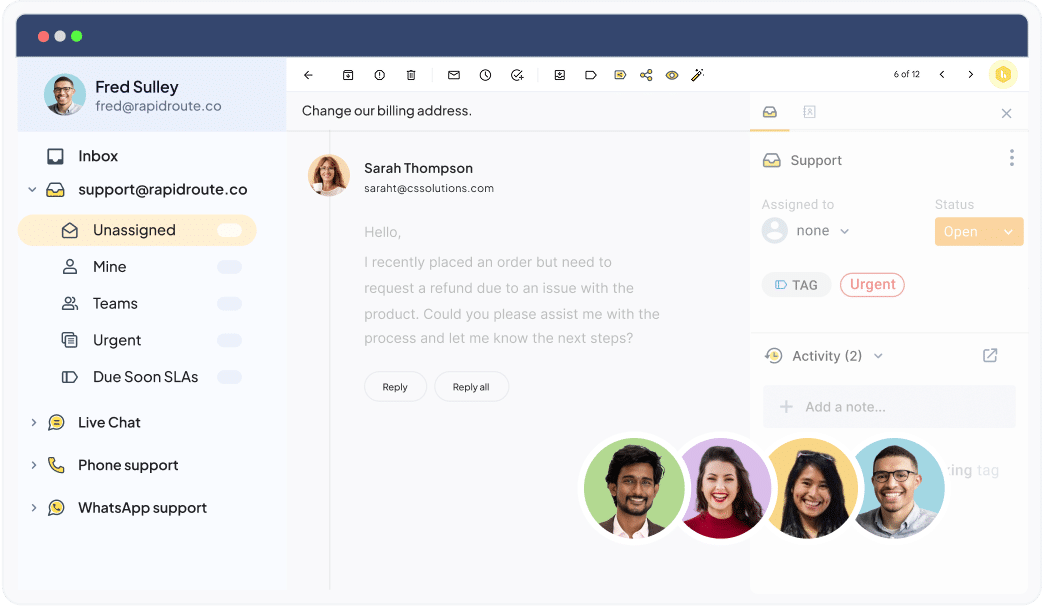
Hiver transforms Gmail or Outlook into a shared help desk that feels simple but powerful. It turns everyday emails into trackable tickets and adds chat, WhatsApp, and voice integration.
Why It’s a Great SugarCRM Alternative
Many support teams outgrow sales-focused CRMs because they’re too complex for daily service work. Hiver offers a lighter setup that focuses on fast responses and team collaboration.
Key CX-Focused Features
- Shared Gmail or Outlook inbox with email-to-ticket conversion
- Chat, WhatsApp, and voice channel integrations
- Automation tools for ticket assignment, reminders, and SLA tracking
G2 Rating: 4.6/5 (1,200+ reviews)
Ideal For
Small to medium-sized teams who seek a straightforward but organized support system and use email for client communications.
Why It Stands Out for CX
By maintaining responsibility, visibility, and collaboration in a recognizable workspace, Hiver assists teams in bringing order to hectic inboxes.
8. LiveAgent
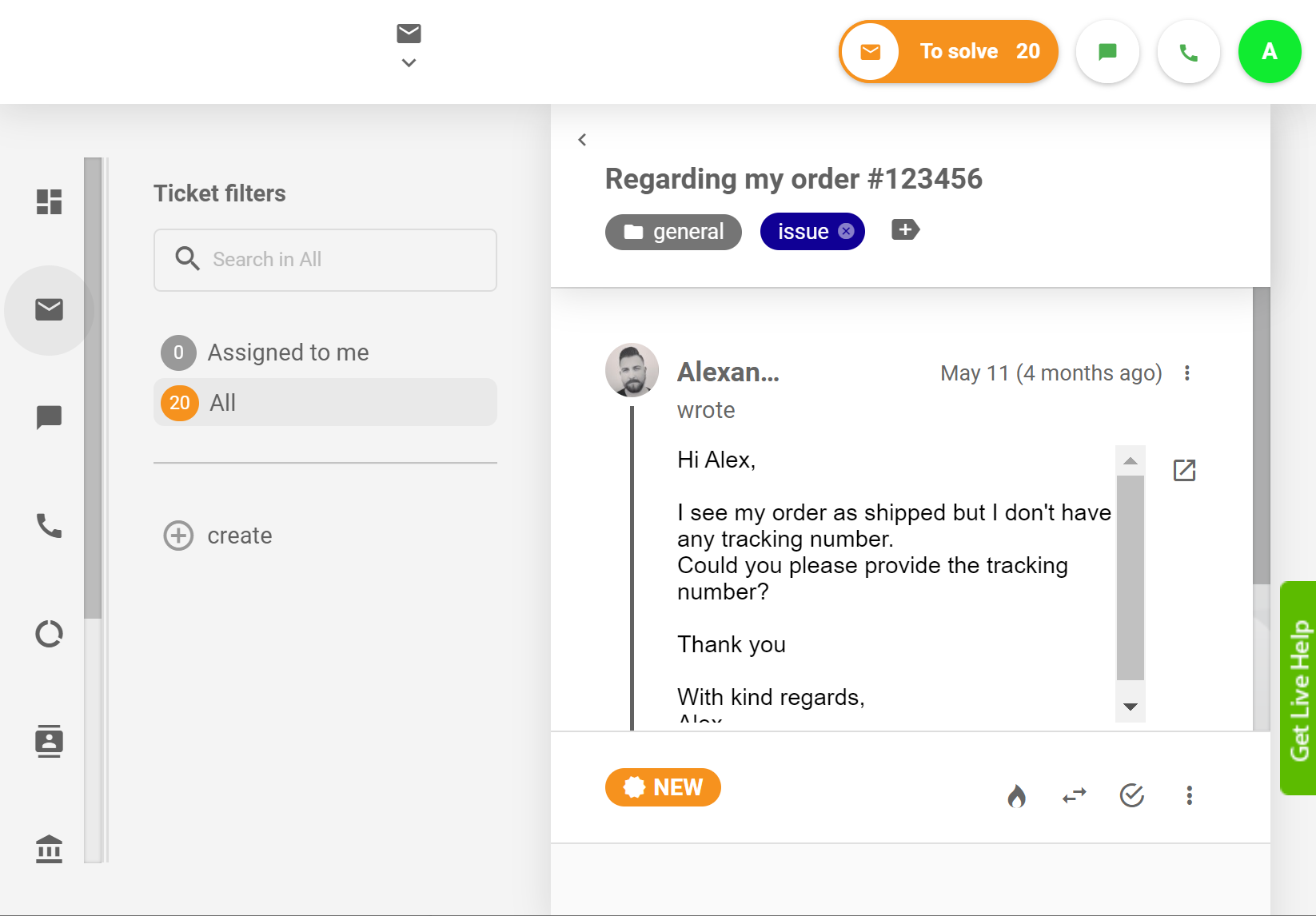
LiveAgent brings all customer interactions into a single dashboard. It’s built to help support teams respond faster, stay organized, and manage every channel without juggling multiple tools.
Why It’s a Great SugarCRM Alternative
When CRMs feel overloaded with features that don’t serve support teams, LiveAgent steps in with a clean, service-focused design. It gives teams one place to handle customer requests across channels.
Key CX-Focused Features
- Unified support for chat, email, voice calls, and social channels
- Smart chatbot and routing powered by AI
- Complete call center setup with IVR, call tracking, and analytics
- Works smoothly with 200+ external apps and integrations
G2 Rating: 4.5/5 (1,500+ reviews)
Ideal For
Customer service teams managing multiple channels require an all-in-one support solution that scales easily.
Why It Stands Out for CX
By combining all interactions into a single, continuous flow, LiveAgent enables teams to react swiftly, maintain context, and provide each customer with a more seamless experience.
9. Front
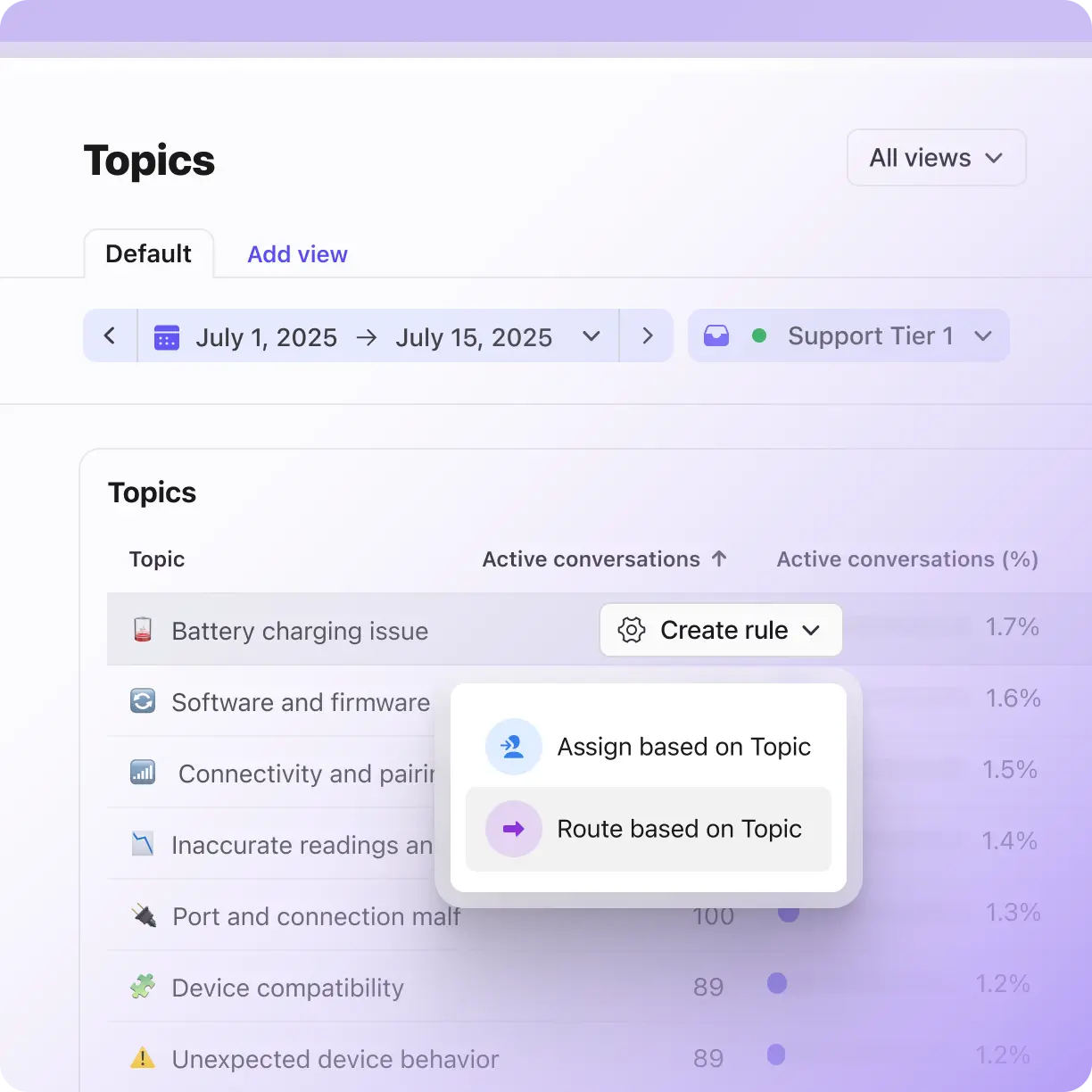
Front turns team inboxes into a shared workspace that connects email, chat, SMS, and other channels in one place. It improves response times and lessens confusion by assisting teams in managing client encounters collaboratively.
Why It’s a Great SugarCRM Alternative
Front enables service teams to manage customer communication more efficiently by keeping conversations, tracking, and collaboration within a single workspace.
Key CX-Focused Features
- Shared inbox with conversation tracking and assignment visibility
- Internal comments and teamwork built directly into each thread
- Rules and automation for routing, tagging, and alerts
- Integrations with more than 50 apps
G2 Rating: 4.7/5 (2,300+ reviews)
Ideal For
Teams that handle a mix of email and chat interactions and want one shared place to manage all customer conversations.
Why It Stands Out for CX
Front keeps communication clear and connected. It helps teams respond faster, stay organized, and deliver consistent service without losing sight of the customer’s history.
10. Gorgias
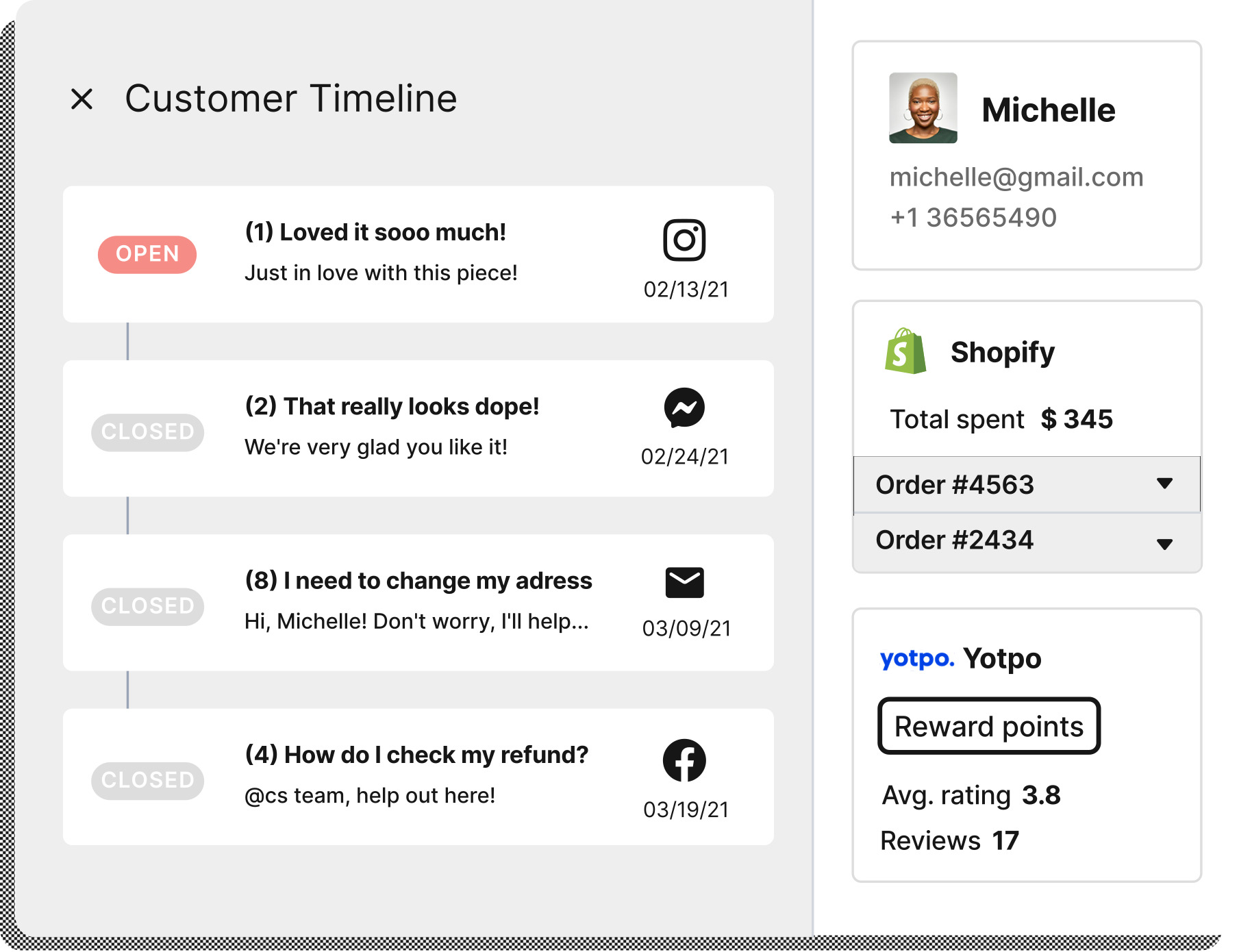
Gorgias serves e-commerce brands managing heavy inbound communication. It brings together email, chat, social channels, and SMS while pulling in order data from Shopify, Magento, and BigCommerce.
Why It’s a Great SugarCRM Alternative
Designed dynamically for digital storefronts, Gorgias merges automation, solid integrations, and in-depth customer context to allow agents to manage support problems from a single integrated workspace.
Key CX-Focused Features
- Unified inbox for email, chat, social, and SMS linked to order data
- AI capabilities that automate tedious tasks, tag tickets, and recommend responses
- Deep e-commerce connectors for refunds, revisions, and order tracking
- Self-service tools and a knowledge base
G2 Rating: 4.6/5 (500+ reviews)
Ideal For
E-commerce service teams that manage multiple support channels and want direct access to customer and order details.
Why It Stands Out for CX
Gorgias helps brands connect support with store data, enabling agents to answer faster, personalize responses, and strengthen customer loyalty through every interaction.
11. Monday Service
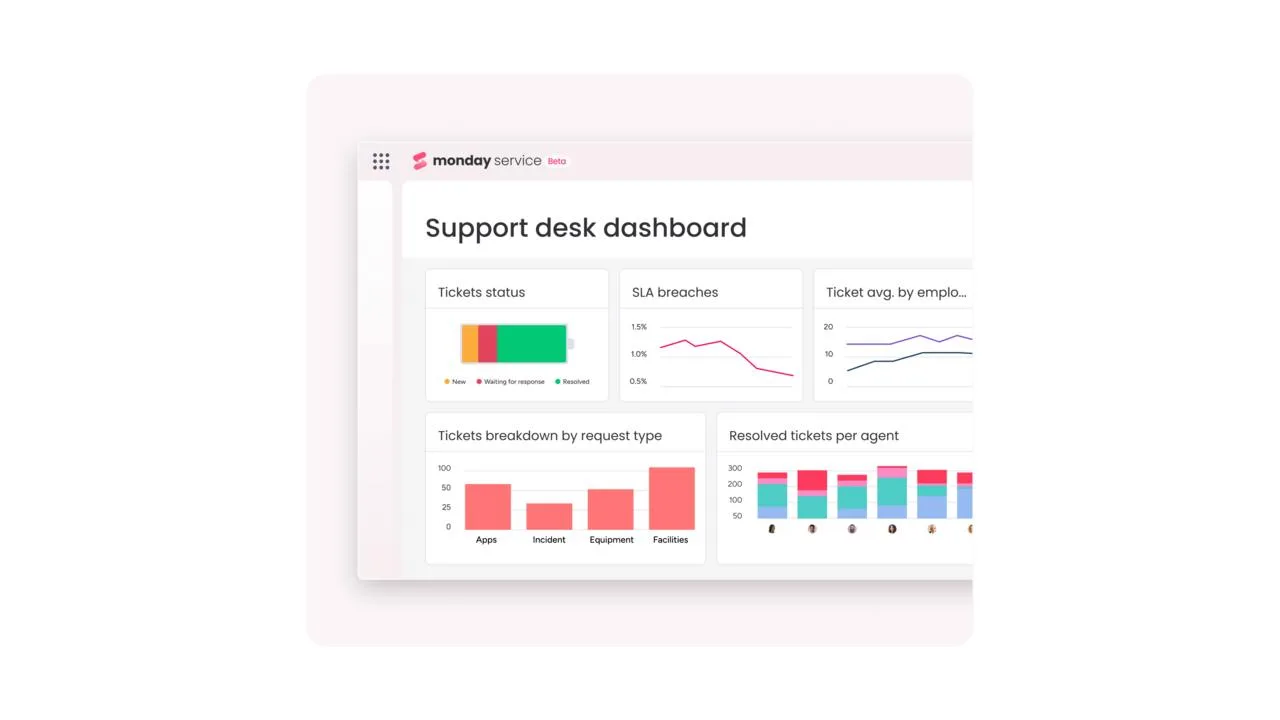
Monday Service brings ticketing, workflow automation, and analytics into one flexible platform. It works just as well for internal IT teams as it does for customer-facing support, giving everyone a clear view of what needs attention and what’s already resolved.
Why It’s a Great SugarCRM Alternative
SugarCRM can feel a bit rigid for service operations that need flexibility. Monday Service gives teams more room to build workflows that fit the way they work.
Key CX-Focused Features
- Centralized management of tickets with visual boards and real-time updates
- Self-service portals and knowledge bases under a brand name
- Automation without coding for routing, notifications, and SLA tracking
- Collaboration tools that are integrated into the system
G2 Rating: N/A
Ideal For
Teams that deal with both external and internal service inquiries and seek a multi-departmental tool.
Why It Stands Out for CX
Monday Service combines structure and flexibility to enable teams provide more seamless service. It keeps all team members in sync and all requests structured.
12. HubSpot Service Hub
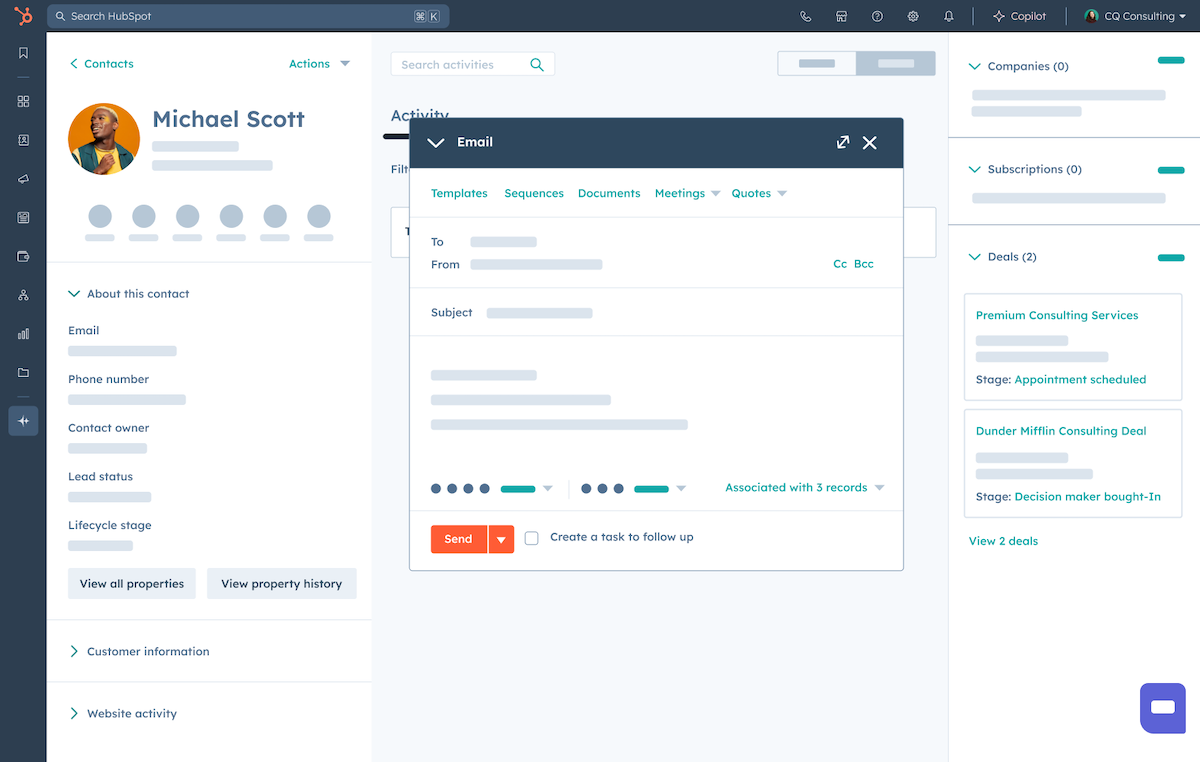
HubSpot Service Hub extends the HubSpot ecosystem into customer service, giving teams access to ticketing, automation, reporting, and shared CRM data.
Why It’s a Great SugarCRM Alternative
Agents can see a customer’s full history, making it easier to deliver fast, relevant, and personalized responses.
Key CX-Focused Features
- Unified inbox for tickets, live chat, and email support
- AI-powered knowledge base
- Shared CRM data for visibility across teams
- Feedback surveys to capture customer sentiment and identify improvement areas
G2 Rating: 4.4/5 (2,800+ reviews)
Ideal For
Teams already using HubSpot for sales or marketing that want to bring their service operations into the same system.
Why It Stands Out for CX
HubSpot Service Hub turns support from a reactive function into a proactive part of the customer experience.
13. ServiceNow Customer Service Management (CSM)
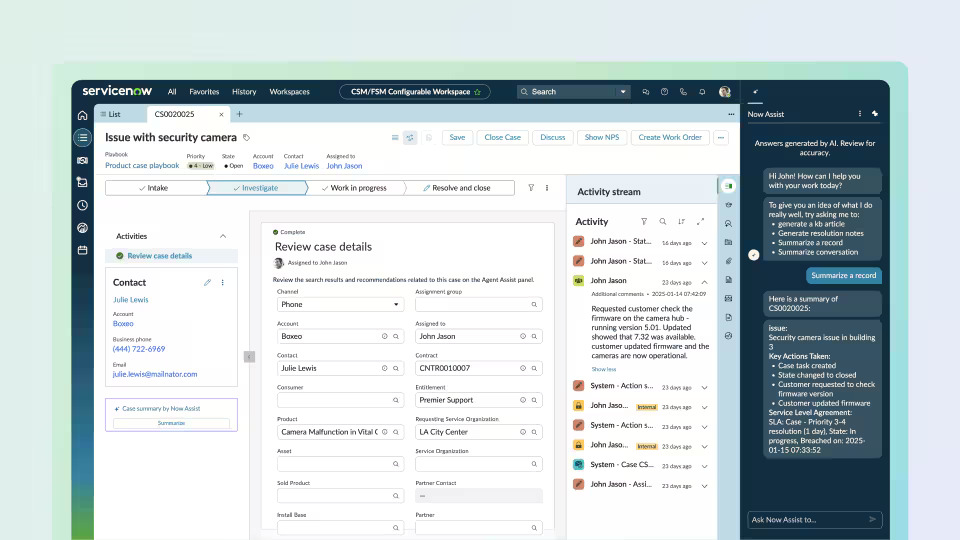
ServiceNow CSM helps large and growing organizations manage customer relationships, cases, and workflows in one connected platform. It’s built for teams that deal with complex service environments and need visibility across departments.
Why It’s a Great SugarCRM Alternative
Teams benefit from SugarCRM’s flexibility, but ServiceNow CSM offers more for businesses who desire integrated automation and improved service and operational coordination.
Key CX-Focused Features
- Unified support across chat, email, phone, and virtual agents
- AI and workflow automation that route cases and predict potential issues
- Knowledge base and self-service options
- Integration with ITSM, HR, and other ServiceNow modules
G2 Rating: 4.4/5 (200+ reviews)
Ideal For
Large organizations that manage service, IT, and operations in one place and need shared visibility along with automation to stay efficient.
Why It Stands Out for CX
ServiceNow CSM connects departments, enabling teams to act sooner and reducing wait times for customers. Faster resolutions and fewer repeat problems lead to a smoother overall experience.
How to Choose the Right SugarCRM Alternative for Your Business
Picking a new CRM isn’t easy. Every company has its quirks. Three crucial elements that frequently make the difference should be taken into account when comparing options: platform, people, and purpose.
1. Clarify Your Purpose
Start simple. What’s not working right now? Maybe reports take forever, automations break, or the interface feels clunky. Write that down. Then picture what “better” looks like: faster replies, fewer steps, less confusion. The CRM that helps you reach those outcomes is usually the right fit.
2. Adapt It to Your People
If your team doesn’t use the system, it won’t operate. Select a platform that works well with the applications your staff is using and that suits their workflows.
Make sure to it on a small scale with a few employees before the complete rollout. Nothing can reveal the limitations of the system more than the users’ firsthand experience.
3. Evaluate the Platform
After narrowing your options, look a little deeper. Check how well the automation actually works and whether it connects smoothly with your data tools. When your team expands, the platform should stay stable and fast.
The Future of CRM: From Customer Relationship to Customer Experience
Originally, CRMs were built just to store customer records and a few notes about interactions. That’s not enough anymore. Modern systems tie together every customer touchpoint, so service feels connected and natural.
1. From Transactions to Journeys
Old-school CRMs tracked deals. Today’s platforms follow the full customer journey.
In a 2025 survey by Nextiva, 96% of respondents said leadership sees CX as a key factor in driving growth. It’s one reason many companies are now working to better connect service, sales, and marketing.
2. AI, Automation, and Unified Data
AI tools are making CRMs smarter. They handle repetitive work, predict what customers might need next, and give agents quicker ways to respond. Companies using them report faster resolutions and fewer dropped conversations.
3. Human-Centered Service Still Matters
Good service still depends on humans, despite all the technology. Consumers appreciate warmth, attention, and clarity. The best CRMs don’t replace that; they make it easier by giving agents the context and tools to respond like humans, not bots.
Conclusion: Finding the Right CX-First CRM Alternative
US companies choosing a new CRM should look for a platform that supports how teams work and how customers prefer to engage. A CX-first solution places service quality and team efficiency at the center, combining automation, collaboration, and clear customer visibility in one place.
Implementing a new system requires commitment, yet the results are lasting. When technology strengthens every step of service delivery, customers experience faster support and greater consistency.
For teams, that same visibility brings control and coordination, shaping a more unified CX landscape across the US.
Kapture CX brings these goals together through a unified service platform designed to help teams manage conversations, automate workflows, and deliver consistent customer experiences at scale.
Book a personalized demo now to explore how we can simplify your service operations!
FAQs
Select an option that actually fits the workflow of your team. The actual benefit is when data remains in one location, although a shared inbox, strong automation, and effective analytics make life easier. Customer problems don’t accumulate if individuals can quickly find what they’re looking for.
People use tools better when they’ve helped shape them. Give a small group time to explore and identify any rough spots. That feedback turns training into something real, rather than just a checklist.
They streamline ticket routing, reporting, and customer tracking, allowing teams to work faster with fewer manual steps. A more dependable and data-driven service delivery is the end outcome.
While licensing fees attract early attention, the real measure of value lies in performance, maintenance effort, and vendor partnership. A platform that reduces overhead and grows with your business usually delivers stronger returns.
